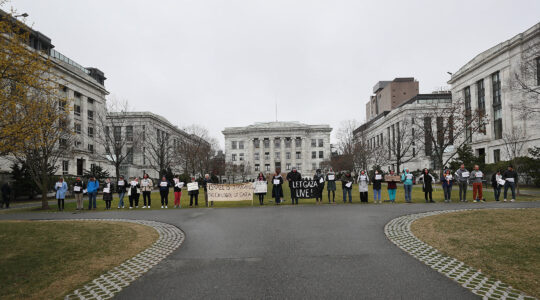WASHINGTON (JTA) — Stephen Bannon, in his first interviews since Donald Trump named him a top White House aide, denied being anti-Semitic or a white nationalist. At the same time, he continued to advance a theory of “globalist” conspiracy that echoes centuries-old anti-Semitic libels, but without any mention of Jews.
“Breitbart is the most pro-Israel site in the United States of America,” Bannon told the Wall Street Journal in an interview posted Friday, speaking of the conservative news site where he was CEO until this summer when he joined President-elect Trump’s campaign.
He dismissed as “a joke” claims that he was peddling anti-Semitism, noting his Jewish colleagues and hires.
Expressions of alarm by an array of Jewish groups, including the Anti-Defamation League and the Reform movement, have not denied the pro-Israel posture of Breitbart and Bannon, but have focused on echoes of anti-Semitic theory and cant found elsewhere on the site and in Bannon’s messaging for the Trump campaign.
Some critics have called out Bannon for at least two recent uses in Breitbart of “Jews” or “Jewish” that some saw as pejorative, and for claims by his ex-wife that he was hostile to Jews. Bannon has vigorously denied his wife’s claims, and the writers of the articles denounced as anti-Jewish have noted they are Jewish and say their use of the terms was misconstrued.
More substantively, Bannon has also been criticized for advancing, through Breitbart and in the Trump campaign’s final weeks, conspiracy theories that involve international bankers, secret meetings and a servile media – all elements of classic anti-Semitic propaganda.
In the campaign’s final days, a TV ad featured excerpts of a Trump speech advancing theories of a secretive conspiracy seeking global control accompanied by images of three prominent Jews.
Neither Bannon nor the campaign have explicitly blamed Jews as a class.
Bannon’s critics compared such messages to the “polite” anti-Semitism of the post-Holocaust period, which avoided pejorative anti-Jewish terminology and at times embraced Israel as a means of divesting non-Jewish societies of Jews.
“That the anti-Semitism is unintentional on [Trump’s] part doesn’t make it any less dangerous,” Cheryl Greenberg, a historian at Trinity College, wrote in an Oct. 26 article discussing Trump and Bannon’s influence on him. “By invoking these conspiracy theories without naming Jews, anti-Semitic ideas are introduced without fanfare into the mainstream political conversation while sending encouragement to those white nationalists who fully understand their implications. And so anti-Semitic sentiment and activity rises without anything explicit being said.”
At least according to their published interviews, neither the Wall Street Journal nor the Hollywood Reporter pressed Bannon on these echoes of anti-Semitic propaganda at Breitbart, nor in the campaign.
Indeed, in both interviews Bannon doubled down on his worldview in which “globalists” are seeking control, and once again, wittingly or unwittingly, invoked echoes of movements that have been hostile to Jews.
“I’m an economic nationalist,” he told the Journal. “I am an America first guy.”
“America First” was the World War II-era isolationist movement that decried mounting calls for America’s involvement in the war as Jewish manipulation.
Bannon acknowledged, as he has in the past, that the nationalists he admires have attracted anti-Semites and racists to their ranks – but also that he rejected these expressions, and believed that these elements would soon fall away.
“I have admired nationalist movements throughout the world, have said repeatedly strong nations make great neighbors,” he told the Journal, apparently referring to movements led by Nigel Farage in Britain and Marine LePen in France, both of whom have in recent weeks celebrated Trump’s victory. (Farage campaigned with Trump and met the president-elect within days of his win.) “I’ve also said repeatedly that the ethno-nationalist movement, prominent in Europe, will change over time. I’ve never been a supporter of ethno-nationalism.”
While many European nationalist movements have in recent years distanced themselves from explicit anti-Jewish comments, racially charged theories remain integral to their platforms, particularly those targeting Middle Easterners and, in central Europe, Roma. Jewish groups in those countries tend to be skeptical of claims that the nationalist movements have divested themselves of anti-Jewish hostility.
In the Journal interview, Bannon praised the “alt-right” movement, which he defines as “younger people who are anti-globalists, very nationalist, terribly anti-establishment.” He also acknowledged the alt-right has “some racial and anti-Semitic overtones.” But he also “makes clear,” according to the interviewer, that “he has zero tolerance for such views.”
He also said, as he did describing European nationalists, that he believes the less savory elements of the movement will one day fall away.
He also said that while Breitbart offers the alt-right a platform, it is not the only outlook represented in the publication. “We provide an outlet for 10 or 12 or 15 lines of thought,” Bannon said. “We set it up that way.”
Bannon also sought in his interview with The Hollywood Reporter to distinguish the nationalism he embraces from white supremacism, but segued immediately into theories of “globalists” maintaining control over the working class.
“I’m not a white nationalist, I’m a nationalist. I’m an economic nationalist,” he said. “The globalists gutted the American working class and created a middle class in Asia. The issue now is about Americans looking to not get f—ed over.”
Speaking to the Journal, Breitbart outlined areas where Breitbart has championed Israel.
“I have Breitbart Jerusalem, which I have Aaron Klein run with about 10 reporters there. We’ve been leaders in stopping this BDS movement” — boycott, divestment and sanctions — “in the United States; we’re a leader in the reporting of young Jewish students being harassed on American campuses; we’ve been a leader on reporting on the terrible plight of the Jews in Europe.”
The Zionist Organization of America and the Republican Jewish Coalition have both defended Bannon against charges of anti-Semitism, noting Breitbart’s pro-Israel content.
Peter Beinart, a liberal Jewish writer who is critical of Israel but also has defended it from attacks from the far left, said backing Israel and Zionism was not necessarily mutually exclusive with anti-Semitism.
Beinart, speaking on CNN on Nov. 15 during a segment on Bannon, cited as an example the pre-World War II Polish government, which encouraged Jewish emigration to pre-state Palestine as a means of decreasing its Jewish population. “For a hundred years, you could find example after example of people who both trafficked in anti-Semitism and also support the state of Israel.”
Attorney Alan Dershowitz, a regular advocate for Israel and Jewish causes, told Breitbart Jerusalem that he saw no evidence of “personal anti-Semitism on the part of Bannon.”
“I think the larger problem – and it’s a very complicated one today – is how you assess a person who himself might not have negative characteristics, but who has widespread appeal to people who do,” Dershowitz continued, describing a problem he sees on the right and left. “And I think the same thing is probably true of some very right-wing conservatives who appeal [intentionally] or inadvertently to people whose values they probably themselves don’t agree with.”
In a new backgrounder on Bannon published on its web site, the ADL concedes that “we are not aware of any anti-Semitic statements made by Bannon himself,” despite the allegations from his ex-wife. It also acknowledges that Breitbart’s Jerusalem bureau was started under his tenure.
“Nevertheless,” the backgrounder continues, “Bannon essentially has established himself as the chief curator for the alt right. Under his stewardship, Breitbart has emerged as the leading source for the extreme views of a vocal minority who peddle bigotry and promote hate.”
JTA has documented Jewish history in real-time for over a century. Keep our journalism strong by joining us in supporting independent, award-winning reporting.






